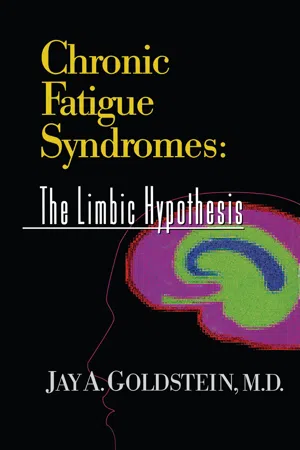
- 286 pages
- English
- ePUB (mobile friendly)
- Available on iOS & Android
About this book
Chronic Fatigue Syndrome (CFS) is now a recognized major and international medical concern. Neglected for many years because of its puzzling wide range of symptoms and inability to be "slotted" into any single mainstream medical discipline, CFS has gained government, academic, and public attention. In this innovative book, Dr. Jay Goldstein provides a medical narrative of an "evolving theory" of how the symptoms of CFS may develop through dysfunction of numerous physiological pathways. He describes the biologic basis of these assumptions, and, based on an analysis of basic medical principles, leads the reader to logical conclusions. In addition, Dr. Goldstein reveals a wealth of clinical experience by describing successes and failures of various therapies and discusses the reasons for the outcomes. Dr. Goldstein's private practice is devoted to patients who fit the profile of a CFS sufferer. As a result, his extensive clinical experience has given him a unique hands-on perspective not readily available to most researchers.Chronic Fatigue Syndromes: The Limbic Hypothesis carefully reviews the extant research literature in each chapter. Although Dr. Goldstein cautions that this model should be viewed only as a PROMISING FOUNDATION for future research, no less than six peer reviewers, all leading researchers and clinicians in the CFS field, have endorsed the direction of Dr. Goldstein's bold proposition. The breadth and scope of this book is perhaps best summarized by Paul Cheney, MD, PhD, a national leader in the field:"Despite its long history, the medical establishment with its great advances in biotechnology has been largely unable to crack the basic pathophysiology of the chronic fatigue syndrome. . . . Dr. Goldstein's new book takes us to a place few people know well, and describes a plausible mechanism of injury to the deep brain which could explain every symptom seen in [patients with] chronic fatigue syndrome. . . . It is the unifying power of his hypothesis, together with emerging scientific support for this view, that makes this book an important one to read for both the patient with CFS, as well as the practitioner and medical scientist who attempt to understand it."
Frequently asked questions
- Essential is ideal for learners and professionals who enjoy exploring a wide range of subjects. Access the Essential Library with 800,000+ trusted titles and best-sellers across business, personal growth, and the humanities. Includes unlimited reading time and Standard Read Aloud voice.
- Complete: Perfect for advanced learners and researchers needing full, unrestricted access. Unlock 1.4M+ books across hundreds of subjects, including academic and specialized titles. The Complete Plan also includes advanced features like Premium Read Aloud and Research Assistant.
Please note we cannot support devices running on iOS 13 and Android 7 or earlier. Learn more about using the app.
Information
Index
Table of contents
- Cover
- Half Title
- Dedication
- Title Page
- Copyright Page
- About the Author
- Preface
- Introduction
- What Is Psychoneuroimmunology (PNI)?
- Chronic Fatigue Syndrome: Limbic Encephalopathy in a Dysregulated Neuroimmune Network
- Diagnosis of Chronic Fatigue Syndrome
- Treatment of Chronic Fatigue Syndrome
- Conclusion
- Addendum I: Transneuronal Retrograde Messengers in Chronic Fatigue Syndrome
- Appendix
- Addendum II: Is Chronic Fatigue Syndrome a Disorder of the Central Neurogenic Regulation of Cerebral Circulation?
- Index